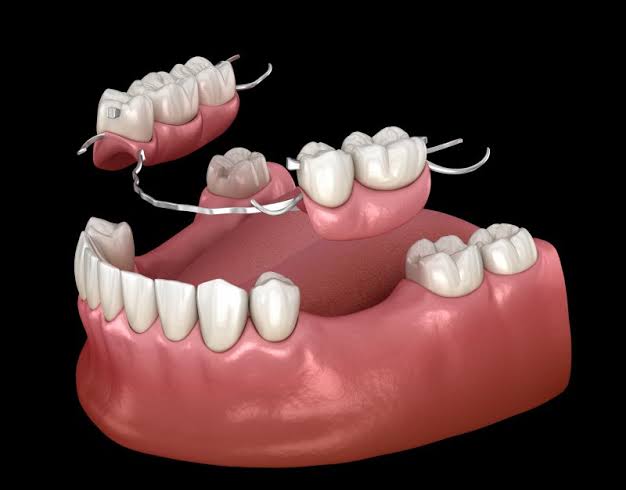Multiple lost teeth can be replaced by partial dentures, but not a whole upper or lower set of teeth. You need to still have some healthy teeth in the upper and lower jaws in order to acquire partial dentures.
What Are Partial Dentures ?
Multiple teeth in the upper or lower jaw are often replaced by partial dentures, which are typically removable.
Dentures are more than just cosmetic dentistry. Additionally, they can improve the wearer’s ability to talk and chew. Additionally, partial dentures help prevent the remaining teeth in your mouth from shifting position over time.
What Makes Partial Denture Necessary ?
If you’ve lost several teeth at the top or bottom of your jaw, partial dentures can be advantageous for you. The following list of causes for tooth loss includes:
• Decay or harm to teeth extraction
Whatever the cause, maintaining the health of your remaining teeth is crucial. The partial dentures will be made by a dentist taking into account your remaining teeth. A dentist could advise having your teeth extracted and replacing them with complete dentures if these teeth are not healthy.
Types Of Partial Dentures
People often have a choice between two types of partial dentures:
• Clasp denture. This kind of denture is secured in position by using tiny, undetectable metal clasps to attach to neighbouring teeth.
• Overdentures are dentures secured by implants. This kind of denture can attach to implanted implants for a more stable, pleasant fit if you have sufficient bone structure to accommodate implants.
Your dentist can provide you with the information you need to choose the partial denture that will work best for you. Your current bone structure affects whether partial dentures will fit you, therefore your dentist will conduct an examination to ascertain your oral health before determining the best course of action.
How Are Dentures Made ?
A few weeks and multiple sessions are required for the denture creation procedure. The main procedures are as follows after your dentist or prosthodontist (a dentist who focuses on the restoration and replacement of teeth) determines what kind of appliance is suitable for you:
• Take many imprints of your jaw and measure the distance between your jaws as well as their relationship to one another.
• Make models, wax moulds, or plastic patterns that exactly mimic the size, shape, and placement of the final denture. Before the final denture is cast, you will “try in” this model numerous times, and the colour, form, and fit of the denture will be evaluated.
• Make a last denture.
• As required, adjustments will be made.
How Do New Dentures Feel ?
For a few weeks, new dentures could feel a bit strange or loose until your cheek and tongue muscles grow used to holding them in place and you feel comfortable putting them in and taking them out. When you initially start wearing dentures, it’s common for slight discomfort or pain to occur, as well as for saliva flow to rise, but these issues will go away as your mouth becomes used to them.
Will Wearing Dentures Change My Appearance ?
Since dentures are created to closely mimic your actual teeth, there shouldn’t be much of a visual difference. In fact, dentures could make you grin wider and look more youthful.
Will It Be Difficult to Eat With New Dentures ?
It may take some getting used to and may be painful for some users for a few weeks to eat with new dentures. Start with soft meals that have been chopped up into little pieces to get acclimated to the new denture. Use both sides of your mouth to slowly chew. Add additional meals as you grow adjusted to your new dentures until you resume a regular diet. With hot or hard meals as well as sharp-edged bones or shells, use caution. Additionally, stay away from excessively hard or sticky meals. Additionally, avoid using toothpicks when wearing dentures.
Will Wearing Dentures change My Speaking ?
Following the installation of dentures, you can have trouble pronouncing some words. If so, practise speaking the challenging phrase aloud. You will get used to speaking properly with dentures with time and practise.
Call your dentist if your dentures “click” while you speak. Occasionally, your dentures could fall out when you laugh, cough, or grin. Biting down and swallowing carefully will help you realign your dentures. Consult a prosthodontist or dentist if a speech issue continues.
Are Dentures Worn Round-the-Clock ?
You’ll receive instructions from your dentist or prosthodontist on how long to wear your dentures for and when to take them off. You could be required to wear your denture constantly for the first several days after getting it, even while you sleep. Even though it could feel painful at first, this is the easiest technique to locate the denture’s potential problem spots. After corrections are made, take off your dentures before retiring for the night. As a result, saliva and the tongue may stimulate and clean the gum tissues as usual. In the morning, the denture can be placed back in the mouth.



